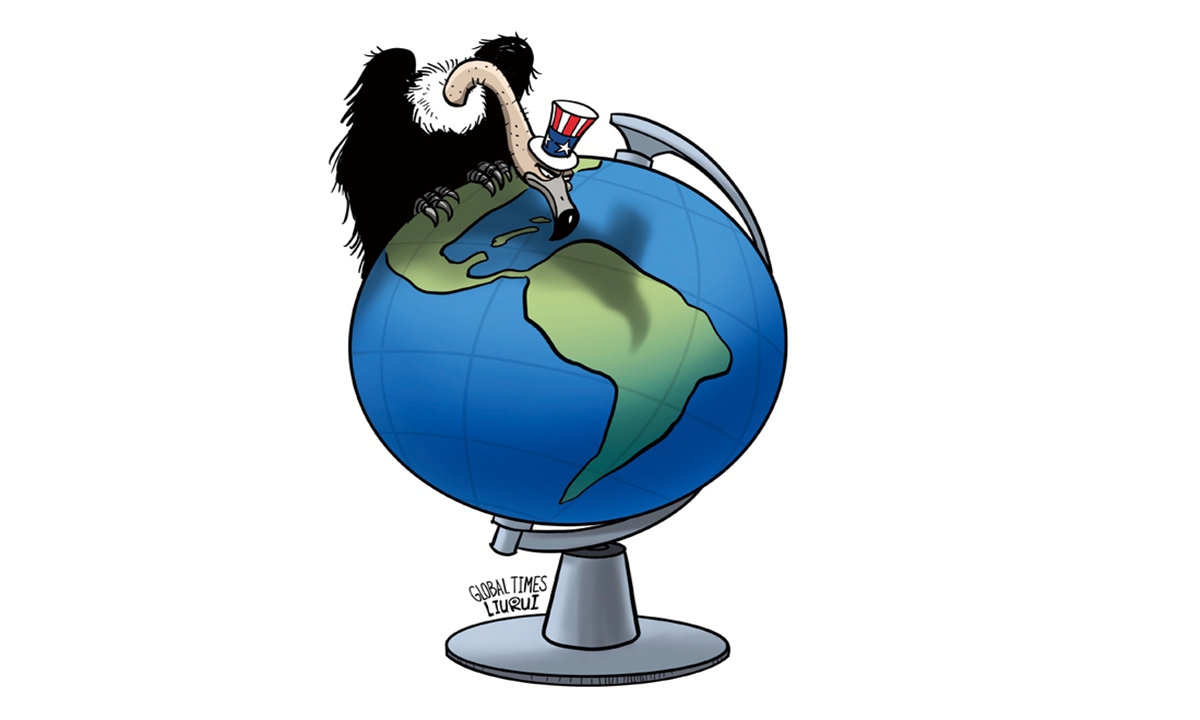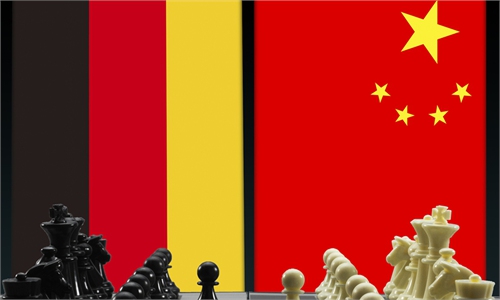
Illustration: Liu Rui/GT
Recently, US Trade Representative Katherine Tai's remarks faced a rebuttal from the Chinese Embassy in Brazil. During her participation in the B20 business summit in Sao Paulo, she suggested that Brazil should "look at the risks" before joining the Belt and Road Initiative (BRI) cooperation. Clearly, Tai's trip to Brazil is another instance of "an educator on a business trip," as the narrative of portraying China as a "risk" is steeped in the specter of "Monroe Doctrine." How could China, as Brazil's largest trading partner, largest export market and main source of surplus, represent a risk and not an opportunity? Additionally, Brazil does not need others to dictate who to cooperate with or what kind of partnerships to conduct, and the normal economic and trade cooperation between China and Latin American countries should not be subject to scrutiny from third countries.
Tai's warning to Brazil reveals a power ideology that regards Brazil as a "geopolitical backyard" of the US, demonstrating a fundamental lack of respect for both the Brazilian government and its people. This is not the first time US officials have meddled in this issue. In May of this year, US Southern Command Commander General Laura Richardson also asserted that participating in the BRI could undermine Brazil's sovereignty during her visit to Brazil. Since 2013, China has signed cooperation agreements for the BRI with over 150 countries and more than 30 international organizations, and no country has lost sovereignty as a result of joining the initiative. In contrast, these US officials pressure Brazil to choose between Beijing and Washington, which constitutes a blatant interference in another nation's sovereignty.
US officials frequently speak of "de-risking" in relation to Latin America, but what Washington truly needs to shed is its persistent "Monroe Doctrine" mind-set. In an attempt to persuade Brazil to abandon the BRI, Richardson made an absurd comparison, claiming that Brazil's diplomatic relationship with the US has lasted 200 years and that "we respect each other's sovereignty," while its ties with China have only been established for 50 years. What she really meant to convey is that China's growing influence in Brazil and Latin America is unsettling Washington's desire to control the region. Viewing China's growing influence in Latin America through a Cold War lens and calculating the "impact" of China-Latin cooperation with a zero-sum mind-set reflects the deep-seated anxieties that plague Washington.
Currently, Brazil is one of the few countries in Latin America that has not yet participated in the BRI. Since Brazilian President Luiz Inacio Lula da Silva took office again last year, there have been continuous reports about Brazil actively advancing related efforts, and this is not coincidental. The initiative is highly aligned with the re-industrialization plan of the Lula government and development strategies such as South American integration routes. It seeks to find partners for Brazil's planned infrastructure projects, particularly those related to various transportation routes in South America, which are fundamental to Brazil's economic interests. In July of this year, Lula publicly stated "I want to know… where we come in and what position we are going to play ... we want to be a starter" regarding the BRI. In response, the Chinese side expressed that China welcomes Brazil to join the Belt and Road family as soon as possible and looks forward to Brazil's worldies in Belt and Road cooperation. This indicates that cooperation between China and Brazil is based on autonomy and voluntariness, with a mutual drive to meet each other halfway.
Currently, the US is attempting to build a "small yard, high fence" against China in Brazil and other Latin American countries. Whether it is the electric vehicle factory invested by Chinese companies in Mexico or the construction of the Chancay port in Peru, both have faced rejection and obstruction from the US. The Chancay port has even been distorted by Washington hawks as being "for military purposes." China has no intention of engaging in military confrontation with any country; the construction of Chancay port aims to create a better platform for trade between the two countries and regional economic development. Once completed, Chancay port will greatly improve the logistics and trade landscape of Peru and the entire South America, reducing the shipping time for goods from the Peruvian coast to China by one-third.
A senior official from Peru once stated that if the US is concerned about China's growing presence in Peru, then it should step up its own investments. The Americas Partnership for Economic Prosperity plan launched by the US in 2022 is said to aim at "countering China's influence." However, to date, aside from a few meetings, it still lacks practical outcomes.
China's cooperation in Latin America has never excluded third parties, and Latin American countries are unwilling to make a "single-choice" between China and the US. Especially in a context where developed economies like the US and Europe are all developing trade with China, it is quite absurd to expect Latin Americans to believe in the so-called theories of "decoupling" or "de-risking." The US could fully join China in the modernization and development process of Latin American countries, rather than viewing the region as a "new frontline" in a confrontation with China.
China and Brazil are the largest developing economies in the Eastern and Western Hemispheres, respectively. Both countries firmly support free trade and oppose protectionism. Last week, Brazil's Agriculture Minister Carlos Favaro said the country should join China's Belt and Road Initiative, noting it would provide Brazil with an "opportunity to overcome trade barriers." The cooperation between China and Brazil not only aligns with the interests of both countries but also meets the need for the "Global South" to build a more just and equitable international economic order. This trend is something that Washington cannot stop.



